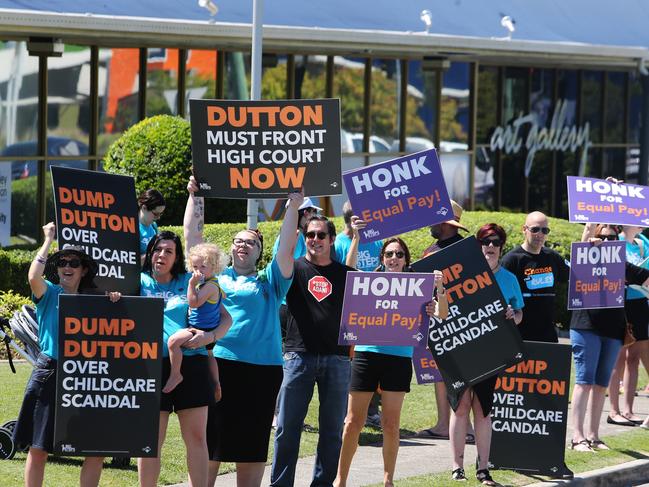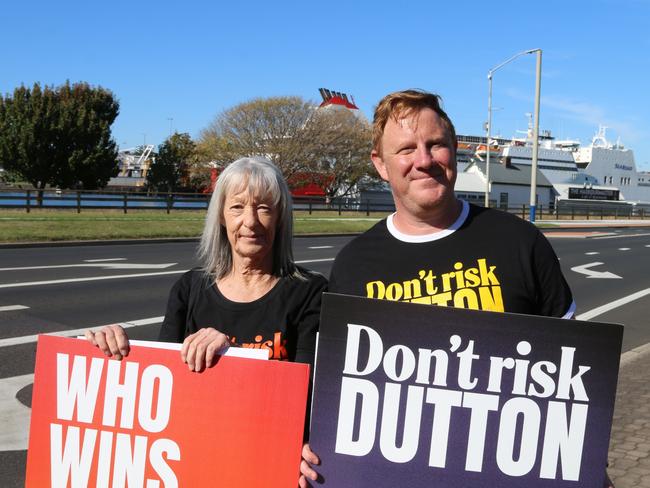New RedBridge poll shows voters don’t love Albanese as their Prime Minister as Dutton fights to stop Labor minority government
A new poll has revealed that some voters in 20 key marginal seats don’t love the idea of Anthony Albanese as their Prime Minister, as Dutton fights to stop Labor forming a minority government.

Federal Election
Don't miss out on the headlines from Federal Election. Followed categories will be added to My News.
A final week move back to Peter Dutton in critical marginal seats will not be enough to prevent Anthony Albanese being returned in a minority, despite more voters thinking he has not done enough to deserve re-election.
The final RedBridge-Accent rolling tracking poll has also revealed voters in key marginals are deeply pessimistic about the future, with only one-in-four saying they expect to be better-off over the next three years.
The poll, which coincided with the Coalition ramping up its advertising spending, recorded a two point dip in Labor’s primary vote to 33 per cent while the conservatives’ primary was steady at 34 per cent.
The final week drop in Labor’s primary means its first preference vote has now fallen one point below its result in the 2022 election while the Coalition’s primary is down 5 points since then.
The movement means that on a two-party-preferred basis Labor now leads the Coalition 53 per cent to 47 per cent, down from 54.5 per cent last week, a result which is identical to RedBridge’s national polling.
The results point to a hung parliament with a Labor minority government despite 47 per cent of voters thinking the government has not done enough to deserve re-election, compared to 40 per cent who think it has and 36 per of voters saying they think will be worse off in three years compared to 25 per cent who think things will be better for themselves.

The movement in voter sentiment since February reveals how Labor has comprehensively out-campaigned their opponents, particularly among women.
Accent director Shaun Ratcliff said if there was a bad result on Saturday night it would be because of “a drastic loss of support among women” in marginal seats.
“The Coalition started February with a small lead among both men and women but since then, Labor has opened up a 10 point two-party lead among women, and also established a small lead with men, giving it a large overall lead in our tracking poll,” he said.
Across each of the six waves of the track, the percentage of voters who say they have heard something in the past week that has changed the way they have felt about the Coalition and Labor has consistently favoured the government.
For example in the latest wave 12 per cent of voters say they have heard something more favourable about Mr Albanese compared with 13 per cent who have heard something unfavourable.
This compares with 21 per cent of voters who say they have heard something unfavourable about Mr Dutton and 13 per cent who say they have heard something more favourable.
Labor’s superior campaign ability has also been reflected in voter sentiment on key issues.
For example. since February the percentage of voters who agree Peter Dutton and the Coalition are ready for government has shrunk from 39 per cent to 31 per while the share who think he is not ready has grown from 43 per cent to 55 per cent.
On the other hand the percentage who think the Government is focused on the right priorities has grown from 32 per cent to 40 per cent.

And despite Coalition warnings about the dangers of a minority government the percentage of voters who think it will be bad for the economy and themselves has actually shrunk since February from 49 per cent to 45 per cent.
The poll also shows voters’ perceptions have improved of Labor’s handling of cost-of-living, housing, healthcare, climate change and the environment and crime and public safety.
In contrast voters’ perceptions of the Coalition’s handling of these issues have all deteriorated in the same period including its handling of crime.
The net favorability of both leaders as well as the Coalition and Labor Parties has also moved in the Government’s favour since February.
RedBridge director Tony Barry the biggest external impact on the campaign had been voter concerns around the global instability and uncertainty due to Donald Trump’s tariff’s announcement.
“But voter perceptions that the Coalition did not have a credible suite of policies to give the electorate hope as well as the confidence to change government has seen the Opposition go from a very competitive position to losing primary vote share,” he said.
“The Coalition’s inability to anticipate and neutralize Labor’s Mediscare campaign around the costs of nuclear energy has been the other failing of the Coalition.”
More Coverage
Originally published as New RedBridge poll shows voters don’t love Albanese as their Prime Minister as Dutton fights to stop Labor minority government





